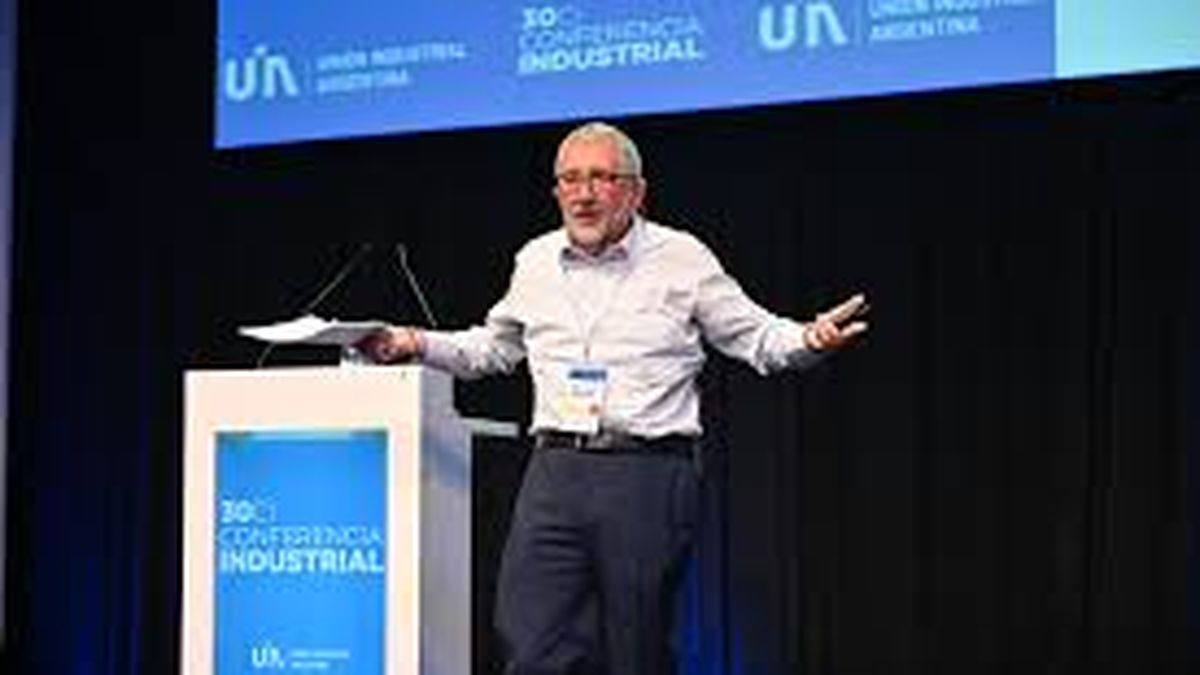Mario Cimoli He is a professor at the Metropolitan Open University (UAM) and former deputy executive secretary of ECLAC. He was passing through Argentina, because he was chosen to speak at the last Annual Conference of the Argentine Industrial Union (UIA), which had the motto “A productive industry in a competitive country.” There they called him “the Keynesianist” who shook the free market speech of President Javier Milei, who did not attend the event.
For the economist, the solution to the competitiveness problem suffered by the national industry is more complex than positioning oneself at one end of the field. “You have to have a sectoral vision, there is no perfect market model,” he says. But it also calls on the sector to reflect: ”American capitalism is reinventing itself, the large highly innovative companies are in the United States. If industrialists do not adapt to that, it will be very difficult to survive.”
Journalist: What is the diagnosis of the industrial sector that you took after your time at the UIA conference?
Mario Cimoli: The first impression I got is that it is a very complex situation, because we are emerging from a crisis situation, with unfavorable macroeconomic variables, a changing and adverse international situation. The industry is going through a very complex situation of high inflation, unstable macroeconomy, low productivity and little investment. In this context, The dialogue between the industrial sector and the Government, with the political sector, would be extremely important for two reasons. The first is that the world is strongly changing towards models where the participation of the State, although the market plays an extremely important role, continues to be crucial for technological, industrial and commercial public policies. The second is that the country will not be able to sustain, as it did not sustain in the previous period, any policy that is carried out without increasing productivity and increasing investments.
Q.: How could you define Javier Milei’s economic model in terms of the industrial sector?
MC: Macroeconomic stabilization is absolutely necessary, it is not only in Argentina. Europe returned to the pre-covid parameters of deficit management, the US will have a spending control program, that is necessary, but on the other hand we must understand that each side has to put its heart into the issue. On the industrial side, they need to understand a much more real competitiveness model. It is not enough to say that the US is going to raise barriers, so we have to do it too. We must have a policy that allows improving the productivity of real employment in Argentine companies, and for that we must have a sectoral vision. Now sectors linked to natural resources are favored, but the textile sector needs another policy, the scientific-technological sector another, etc. We must understand that the world to come will be more competitive and tougher because we are entering a new industrial and technological paradigm. The victory of Donald Trump does not put “trade yes or trade no” on the table, but that American capitalism is reinventing itself, the large highly innovative companies are in the United States. If industrialists do not adapt to that, it will be very difficult to survive. We must assume the need for State policies aimed at the industrial sector, but at the same time a need for industrialists to make this work. On the part of the private sector, it is true that they need security of contracts, a clear problem of progressivism that did not understand that there must be a certain legal security, that investments must be encouraged, that industrialists are not all the same. On the part of the State, they have to understand that there is no perfect pure market model, in reality it is more pragmatic than one thinks, but there is no perfect trade model. Almost all economies, even those managed by center-right governments, are managed by industrial policy.
MERCOSUR FAMILY PHOTO.jpg
The presidents of the Mercosur countries and the envoy of the European Community. Summit last week in Montevideo.
Presidency
Q: What role does deregulation play in the industry? For or against?
MC: There is a certain deregulation that is necessary, but for example, center-right governments have institutes that regulate the production and access to drugs, institutes that have a very strong impact on industrial policy. Not having that would be a mistake, you can’t deregulate there. It cannot be deregulated, for example, in certain conditions where companies only play their monopoly role, if they innovate little and have a large monopolistic market. You have to know how to intervene so that there is much more competition. Americans teach this very well with antitrust policy. Stop regulating those who are innovative, but if they stop doing so, control them. In institutions and market behavior, we must have a fine regulation capacity, which is extremely important. Deregulation for certain things, yes, but a regulatory model that gives rise to legal certainty is also important. For example, Italy, with a center-right government, did not deregulate public health at all, it continues to function and they even increased the budget. On the other hand, the university system in Australia, another example, is public but has a strong relationship with the private sector. We must deregulate the ability to be innovative so that young people can start businesses, so that there is mobility of capital and access to credit, but we must think very carefully, Thinking exclusively about deregulating everything as a solution is an economic policy error.
The state-market fusion
Q: Is an exchange rate appreciation and opening of imports sustainable for the industry?
MC: In the long term it can hit employment hard, increase the informal sector, and reduce productivity. If they carry out a model of this type, they will have super competitive sectors, but a very high informal workforce, the average productivity of the country will be low and will not give rise to growth and having the resources to distribute later. Recovering that lost formal job could be very difficult. What is interesting is how much the market alone and exclusively can incorporate high productivity employment. If you get fired, many say “it doesn’t matter, I work at Rappi”, but that is an optical illusion. If you work for ten years at Rappi, you will never be able to work in a highly productive company again. Let’s be very careful with that.
Q.: From a Latin American perspective, how does the agreement that you seek to institutionalize with the European Union benefit the MERCOSUR countries?
MC: There is a Latin America in which the large agribusiness exporters are going to do well. If the market is opened to SMEs under the conditions of the markets in Europe, there will be a strong wave of industrial products, which is what Germany is most interested in. Latin America may win some sectors, but it will hardly be a success for the industry, so the issue of employment and how to maintain it will be a problem. The other fear of mine is that the Europeans will make a lot of industrial policy, and Argentina has very little. Paraguay and Uruguay do not have it, Brazil has something else. There you can find a situation that is really unfavorable to industrial development. All this is happening when the US is going to increase barriers, and Europe thinks that since they raise barriers they can look for their market in Latin America, but that result is not so linear. We must understand that the model of capitalism is changing, what is happening in the United States is being read very poorly. The center left tells you that the populists have arrived and the right that pure sovereignty has arrived, but let’s think about this: Elon Musk is with Trump, and if Harris had won he would be with her, because how can such a large company not be part of endogenous of US foreign policy? He will do it with any government. Biden did not release any tariff policy. The US is changing the global capitalist model, after globalization. The productive and technological forces of Latin American countries are poorly suited to this type of issue. There is no deep debate. If you analyze it with canons (populist or not) it doesn’t work like that.
Q: Do you think Milei understands this change in panorama?
MC: Elon Musk and Trump understand the state-market fusion, an alliance, a rapprochement of the much more endogenous process, because they have other types of companies, not old monopolies that came to a country and exploited. This is about global networks, with global technology, the launches that Elon Musk makes into space, he does it under strong alliances with NASA, don’t you realize that it is a market-state alliance to conquer space? The Europeans proposed regulating space, and Musk is going to build them a ladder to climb because they didn’t do it. The problem is that I don’t think this interpretation has been made in Argentina. It seems to me that you are reasoning with old canons. You have to find the ability to reinvent yourself. I’m not saying that there were no mistakes before, but rethinking this new world would be important, with a discussion on the part of the productive sector.
Source: Ambito




